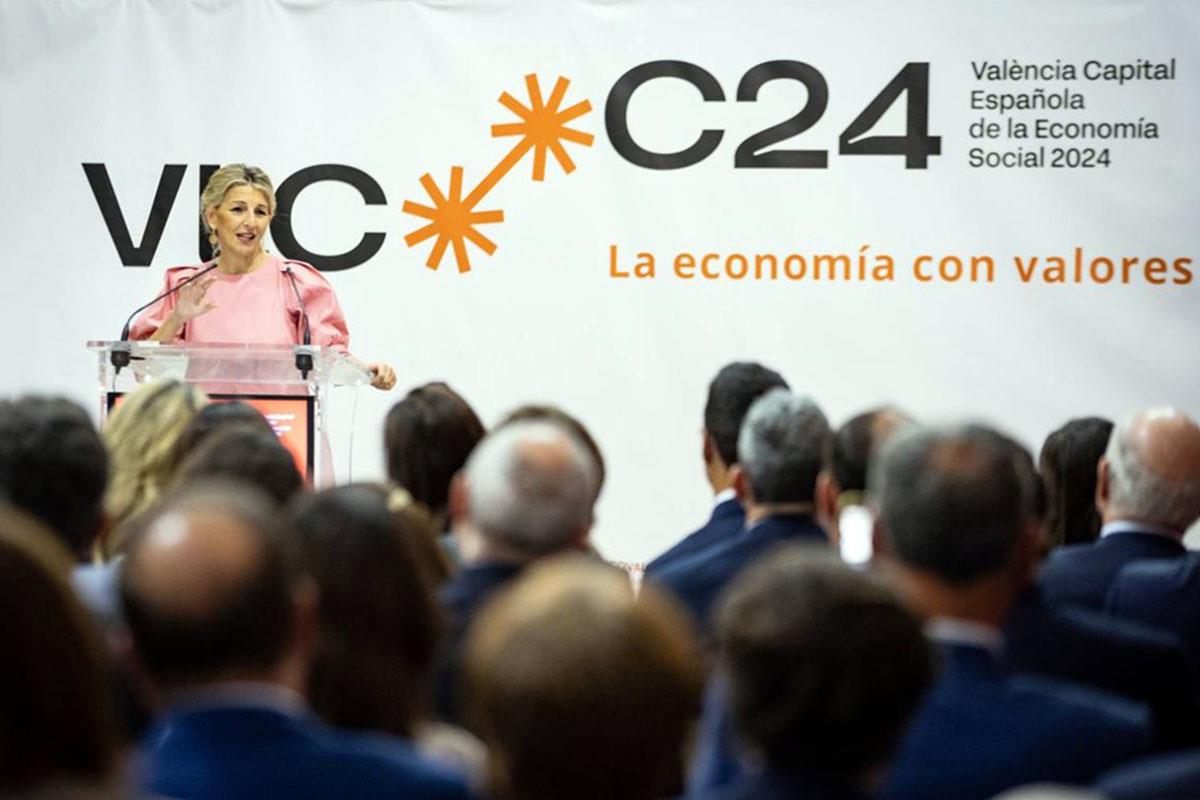At the premiere of Valencia as capital of the Social Economy
Yolanda Díaz: "Promoting the Social Economy means tackling inequality and advancing welfare"
News - 2024.4.5
 The Second Vice-President of the Government of Spain and Minister for Work and Social Economy, Yolanda Díaz, during her speech at the event
The Second Vice-President of the Government of Spain and Minister for Work and Social Economy, Yolanda Díaz, during her speech at the event
"The Social Economy is a different model: feminist, inclusive, sustainable, democratic", stressed the vice-president, who urged Valencia to continue the work done in previous years by Donostia, Santiago de Compostela, Teruel and Toledo to consolidate Spain as a benchmark and vanguard of the Social Economy in Europe.
In this regard, Díaz recalled that last year Spain led the way in approving the first United Nations Resolution on the Social and Solidarity Economy, "a milestone that seemed unthinkable just a short time ago," said the vice-president.
Valencia, the first Mediterranean capital of the Social Economy
In Valencia, this economic model is made up of around 9,400 entities, including cooperatives in different sectors (from agriculture to housing or electricity, among others), labour companies, special social initiative employment centres, insertion companies, agricultural transformation companies, mutual social welfare societies, fishermen's guilds and third sector social action.
Together they generate more than 165,000 direct and indirect jobs in the Valencia Region. At the national level, there are around two million jobs, which is why the Ministry for Work and Social Economy has promoted a PERTE for the Social and Care Economy with more than 1.7 billion euros in which ten ministries are involved. It is a unique project in the European context, with more than 400 projects submitted to the last call for proposals earlier this year.
Díaz, who concluded the presentation, which was also attended by the Regional Minister for Education, Universities and Employment of the Generalitat Valenciana, José Antonio Rovira, and the Mayor of Valencia, María José Catalá, called for "collaboration between different people, with the common good and the welfare of the social majorities as the horizon".
The minister also explained that the Social Economy is distinguished by the primacy of people over all other considerations, as well as by its participatory governance, its contribution to social cohesion and its commitment to the territories in which it is based. Its expansion, she said, "means tackling inequality and advancing welfare."
The vice-president also emphasised that during the Spanish presidency of the Council of the European Union (EU) last year, she promoted the first EU recommendation to promote and advance this productive model.
"I am convinced that Valencia will serve to expand the social economy in our country and beyond our borders," she added.
Congresses, presentations, assemblies and a big event in November
The economy with values is the motto that will preside over the first Mediterranean Social Economy Capital, which throughout the year will host various assemblies of regional and national organisations in the sector, congresses, presentations of studies on the impact of the Social Economy, as well as a co-operative film series and meetings with female leaders in the Social Economy, among others. In addition, a major event will be held in November, with more details to follow. All events will be published on the website.
Díaz, who travelled to the Mediterranean city in the company of the Secretary of State for the Social Economy, Amparo Merino, began the day with a visit to the head office of the Confederation of Cooperatives of Valencia (Concoval), where the she met with representatives of the main Valencian Social Economy organisations.
Non official translation




